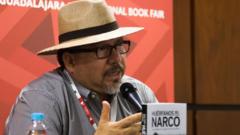In a significant move regarding the ongoing battle against impunity for crimes against journalists, Mexican officials are urging the United States to extradite Dámaso López Serrano, a figure suspected of orchestrating the murder of journalist Javier Valdez in 2017. Valdez, who was renowned for his investigative reporting on the Sinaloa Cartel, was shot dead in Culiacán, raising alarms about the risks faced by reporters in regions heavily influenced by drug trafficking.
Mexican Attorney General Alejandro Gertz stated during a press conference that López Serrano, also known as "Mini Lic", was identified as the "mastermind" behind Valdez's assassination. López Serrano was apprehended in Virginia on December 13 on separate fentanyl trafficking charges. Gertz emphasized that Mexico has repeatedly requested his extradition but has encountered obstacles as U.S. authorities previously considered him a "protected witness" due to his cooperation with them.
The investigations reveal that López Serrano’s motive for allegedly ordering the murder stemmed from his dissatisfaction with Valdez’s reporting, which delved into the violent power struggles within the Sinaloa cartel. López Serrano is the son of former cartel lieutenant Dámaso López Núñez, who played a pivotal role following Joaquín "El Chapo" Guzmán's incarceration. Historical tensions and internal conflicts within the cartel inadvertently placed Valdez in peril as he published material critical of its members, including derogatory descriptions of López Serrano shortly before his death.
The climate for journalists in Mexico remains dire. According to Reporters Without Borders, over 150 journalists have been murdered in the country since 1994, making it one of the most dangerous places for media professionals. The violence appears to be escalating, as demonstrated by the recent shootings of journalists in Uruapan and Colima.
López Serrano, who cooperated with U.S. authorities after surrendering in 2017, was released on parole in 2022. His re-arrest serves as a potent reminder of the ongoing fight against drug-related violence and the complex nature of law enforcement efforts on both sides of the border. The call for extradition not only highlights the specific case of Valdez but also underscores the broader, systemic issues of journalist safety and the influence of organized crime in Mexico.
Mexican Attorney General Alejandro Gertz stated during a press conference that López Serrano, also known as "Mini Lic", was identified as the "mastermind" behind Valdez's assassination. López Serrano was apprehended in Virginia on December 13 on separate fentanyl trafficking charges. Gertz emphasized that Mexico has repeatedly requested his extradition but has encountered obstacles as U.S. authorities previously considered him a "protected witness" due to his cooperation with them.
The investigations reveal that López Serrano’s motive for allegedly ordering the murder stemmed from his dissatisfaction with Valdez’s reporting, which delved into the violent power struggles within the Sinaloa cartel. López Serrano is the son of former cartel lieutenant Dámaso López Núñez, who played a pivotal role following Joaquín "El Chapo" Guzmán's incarceration. Historical tensions and internal conflicts within the cartel inadvertently placed Valdez in peril as he published material critical of its members, including derogatory descriptions of López Serrano shortly before his death.
The climate for journalists in Mexico remains dire. According to Reporters Without Borders, over 150 journalists have been murdered in the country since 1994, making it one of the most dangerous places for media professionals. The violence appears to be escalating, as demonstrated by the recent shootings of journalists in Uruapan and Colima.
López Serrano, who cooperated with U.S. authorities after surrendering in 2017, was released on parole in 2022. His re-arrest serves as a potent reminder of the ongoing fight against drug-related violence and the complex nature of law enforcement efforts on both sides of the border. The call for extradition not only highlights the specific case of Valdez but also underscores the broader, systemic issues of journalist safety and the influence of organized crime in Mexico.
















